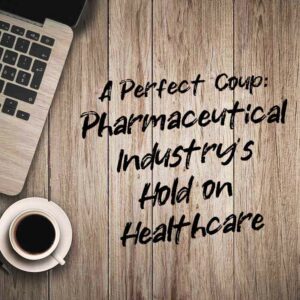In the realm of global healthcare, the pharmaceutical industry’s influence is both pervasive and potent. Operating much like a game of chess, each move is carefully planned, enabling the industry to exert control over various sectors including the media, scientific research, academia, physicians, health organisations, regulatory bodies, patient advocacy groups, and the pharmacy industry. This extensive reach could arguably be described as the perfect coup. Let’s delve into this further.
Media: Shaping the Paradigm
The relationship between the pharmaceutical industry and the media is both multifaceted and symbiotic. The industry relies on the media’s extensive reach to disseminate information, employing marketing strategies that shape public perception and patient behaviour. Concurrently, media outlets often rely on pharmaceutical advertising as a revenue stream, a dynamic that can inadvertently shape the narrative around specific medications and health conditions. One striking example is Purdue Pharma’s marketing campaign for OxyContin in the late 1990s and early 2000s. By placing ads in medical journals and on television, Purdue successfully convinced both physicians and the public that their drug was a safe solution for pain management. This aggressive marketing strategy led to a surge in prescriptions and played a significant role in fuelling the opioid crisis in the United States. Moreover, the media often promotes the notion of new ‘wonder drugs’ in trial phases for treating Alzheimer’s, a perspective not shared by ethical scientists with a comprehensive understanding of the disease.
Control over Science and Research
Pharmaceutical companies have significant financial resources, some of which are devoted to conducting scientific research. Consequently, they exert a notable influence on the direction and focus of research, sometimes leading to accusations of bias. The industry’s control over clinical trials is a key concern, with potential for selective reporting, skewing data, and under-reporting adverse effects. A notorious example is that of Merck’s anti-inflammatory drug, Vioxx. Despite being aware of the drug’s cardiac risks, Merck allegedly manipulated clinical trial data to understate these risks, allowing the drug to stay on the market and be prescribed to millions. When Vioxx was finally withdrawn from the market in 2004 due to safety concerns, the ramifications were substantial.
Influence on Universities and Academia
Universities and academia are not immune to the pharmaceutical industry’s reach. Many universities receive research funding from these corporations, which can influence study design, data interpretation, and publication. A Senate investigation in 2010 revealed that Emory University’s Charles Nemeroff failed to disclose over a million dollars in payments from pharmaceutical companies while leading a government-funded research project on a drug made by GlaxoSmithKline. This serious conflict of interest prompted a broader discussion on the need for more transparency in academic research.
Doctors: The Industry’s Foot Soldiers
Doctors, distinguished by the esteemed title ‘Dr.’, often unwittingly become instruments of the pharmaceutical industry, prescribing and endorsing medications that serve the industry’s interests. The allure of their status education, the prestige associated with driving high-end European luxury cars, as well as enticing career advancements and high-paying speaking engagements, can sometimes overshadow the need for impartiality. As a society, we have a tendency to place doctors on a pedestal, attributing their evident success, education, and affluence with unparalleled expertise and trustworthiness. Yet, this very status becomes a gateway for pharmaceutical corporations to exploit. A glaring instance of this exploitation is seen in the case of Insys Therapeutics, where corporate executives faced convictions for racketeering in connection with aggressively promoting the potent opioid Subsys. Their audacity was further showcased when the company created a rap video urging sales reps to ramp up prescriptions, highlighting the extreme lengths some companies will resort to in promoting their products. highlighting the extreme lengths some companies will resort to in promoting their products. Notably, the legal ramifications were significant. John Kapoor, the founder and former chairman of Insys, was sentenced to 5 and a half years in prison in January 2020 for his role in this racketeering scheme. Additionally, former CEO Michael Babich and several other top executives faced prison sentences for their involvement.
Infiltration of Health Organisations and Advocacy Groups
Health organisations and advocacy groups, despite their pivotal roles in healthcare, are far from immune to the influence of the pharmaceutical industry. Often reliant on external funding, these entities, including the Alzheimer’s Association, which benefits significantly from Merck’s financing, may find their positions swayed by such contributions. This influence is evident in the Alzheimer’s Association’s denial of aluminium’s role in contributing to Alzheimer’s disease. Such circumstances raise concerns about potential conflicts of interest and the neutrality of the support they provide. This apprehension is further underscored by situations like that of the National Alliance on Mental Illness (NAMI), which, in 2009, was revealed to receive a majority of its donations from drug manufacturers. Compounding this complexity, pharmaceutical companies often establish their own patient advocacy groups, utilising them as platforms to promote their business interests, subtly influencing treatment guidelines, drug approval processes, and healthcare policies. The extent of the pharmaceutical industry’s infiltration into these organisations underscores the magnitude of its impact on healthcare.
Regulatory Capture and Drug Pricing
Government regulatory bodies like the FDA are often subject to influence from pharmaceutical companies, leading to concerns about their impartiality. For instance, a report published in the British Medical Journal in 2020 highlighted the prevalence of former or future pharma executives within the FDA, suggesting a potential conflict of interest. Furthermore, in countries where drug price regulation is lax, often due to pharmaceutical lobbying, the costs of medications can skyrocket. The case of Martin Shkreli, former CEO of Turing Pharmaceuticals, who increased the price of the life-saving drug Daraprim from $13.50 to $750 per pill overnight, serves as a stark example of such practices. These high prices can restrict access to necessary medications, creating a significant public health concern.
Direct-to-Consumer Advertising and Role of Pharmacies
In countries like the United States and New Zealand, pharmaceutical companies can advertise prescription drugs directly to consumers, thereby influencing public opinion and medical decisions. Notably, the aggressive advertising of the cholesterol-lowering drug Lipitor helped it become the world’s best-selling drug of all time despite debates about its necessity for many who took it. In addition, pharmacies, particularly large chains, interact directly with consumers and can impact medication choices due to agreements with specific pharmaceutical companies. For instance, CVS Pharmacy, a large chain in the U.S., has faced criticism for its partnership with drug manufacturer Pfizer, which reportedly influenced the chain’s promotion and distribution of certain medications over their competitors.
Ethics and Clinical Trials
Pharmaceutical-sponsored clinical trials, especially those conducted in developing countries, raise ethical concerns related to informed consent, exploitation of vulnerable populations, and post-trial access to treatment. One such case involved Pfizer’s Trovan trials during a meningitis outbreak in Nigeria in the 1990s. It was alleged that the company did not obtain proper informed consent and used the health crisis to hastily conduct trials, resulting in several children’s deaths and permanent disabilities. These instances underscore the urgent need for stringent oversight and ethical conduct in clinical trials.
*
While the significant contributions of the pharmaceutical industry to healthcare are indisputable, the vast sway it holds over various facets of the sector cannot be overlooked. The far-reaching influence, evident in situations as diverse as Purdue Pharma’s assertive OxyContin marketing, the distortion of scientific research, and the manipulation of clinical trials, permeates the media, academia, physicians’ practices, regulatory bodies, advocacy groups, and pharmacies. This degree of dominion over crucial components of healthcare paints a striking image of a masterfully orchestrated coup.

Nils Strohbeck
Connect
A Perfect Coup: Pharmaceutical Industry’s Hold on Healthcare
A dive into industry's extensive influence
Lead and the Fall of the Roman Empire: Welcome the ‘Aluminium Age’
How Aluminium is Affecting Our Health









